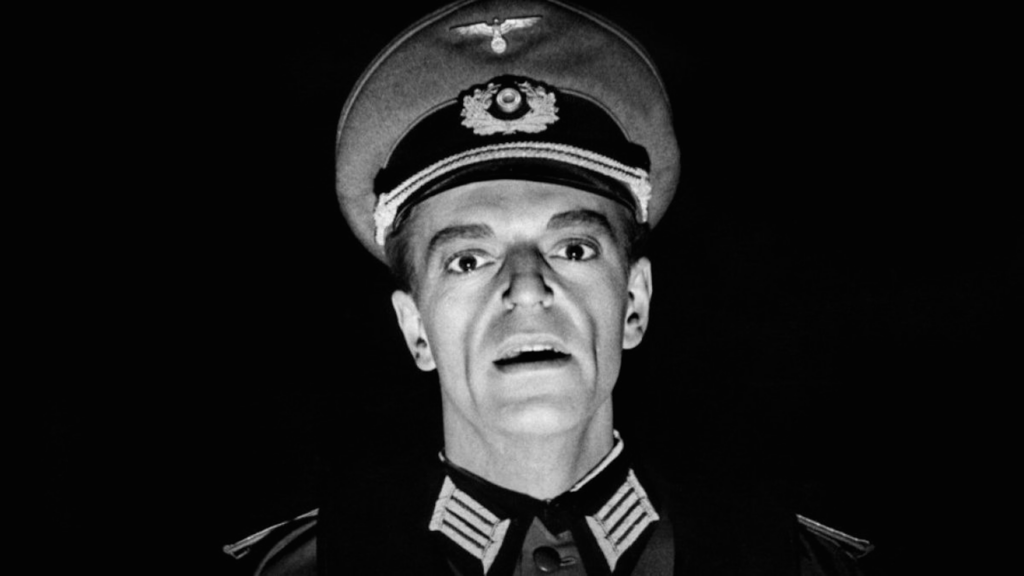A Former French Resistance Member Who Named Himself After His Favorite Author, Jean-Pierre Melville Merits a Retrospective
There’s not an out-and-out loser among his 13 films. Even the least convincing is imbued with density of vision, cinematic stylishness, and some-or-other quiddity that is more than mere diversion. He was a master.

‘The Complete Melville’
Film Forum
July 26-August 1
Werner von Ebrennac is among the more vexing Francophiles in the history of cinema; among the most naive, as well. He’s a lieutenant in the armed forces of Nazi Germany, the Wehrmacht, and has been billeted at a modest house in the French countryside. The place is occupied by an elderly man and his young niece, the “hosts” for Ebrennac’s stay. The pair, seemingly through osmosis, decide not to speak to the lieutenant. At all.
Ebrennac has a lot to say. He’s a student of French culture — literature, especially — and fluent in the language. His vision of what the Nazis hope to accomplish with the French state, though not unmarked by Germanic chauvinism, is less about occupation than it is about partnership. Ebrennac repeatedly uses marriage to describe this ideal state, an analogy that is not lost upon the young French woman. What does she think of this impassioned young man? It’s hard to tell.
That’s the basic setup for director Jean-Pierre Melville’s debut feature, “Le Silence de la mer” (1949). The film was based on a novella of the same name by Jean Bruller or, given that it was published on the sly during the time of the Vichy government, the nom de plume Vercors. The book, meant to instill dissent amongst the populace, was highly sought after as contraband. The first scene in the Melville picture has two passersby on a desolate Parisian bridge trading an illicit briefcase. Bruller’s book is squirreled away inside.
Melville (1917-73) is likely best known as a director of crime films, of stories rife with hoodlums, trench coats, secret societies, and underworld archetypes culled from American crime dramas. “Le Silence de la mer” isn’t that, not quite, though the picture is marked by the flatly stated gravitas of the director’s maturity. The events are achingly even in their pacing, a fact iterated by the tick-tick-tick of a clock that often overtakes the soundtrack. The picture is given to awkward silences. It is tense, often hard to parse, and ultimately moving.

As a one-time member of the French resistance, Melville had skin in the game. During the war, Jean-Pierre Grumbach adopted the name of his favorite author, Herman Melville. As proof that there are bigger forces at work, the American’s novel “Pierre; or, the Ambiguities” was especially formative for the burgeoning filmmaker. The literary critic Harold Bloom said of the book that “you just cannot get through it, unless you badly want and need to do so.” On the heels of “Moby Dick,” “Pierre” proved a dark, fiercely frustrating story.
“Le Silence de la mer” is wound with a similarly knotty strain of impenetrability, as are most of the films featured in an upcoming overview at Film Forum, “The Complete Melville.” The oeuvre isn’t huge: a mere 13 films. Still, there’s not an out-and-out loser in the bunch. Even the least convincing of the pictures is imbued with density of vision, cinematic stylishness, and some-or-other quiddity that is more than mere diversion. He was a master of the art.
“La Silence de La Mer” generates its own peculiar aura, not least because so much of what takes place is occluded by passivity. Howard Vernon plays Ebrennac as a man driven to quiet desperation by loneliness and disappointment, but his is the showy role. The fortitude Jean-Marie Robain and, especially, Nicole Stéphane bring to their roles as the uncle and the niece is as much a tease as it is beguiling, and is broken only by Melville’s abrupt use of close-ups.
For many a director, this film would have been the culmination of a life’s work. But it was only a beginning for Melville, a director whose trajectory will be put on resplendent display down on West Houston Street.

